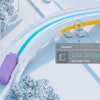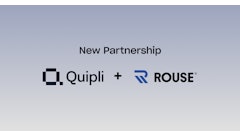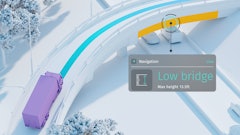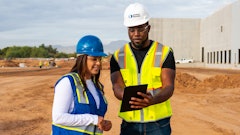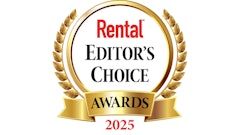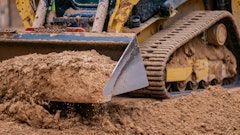
Rental has covered software before. Part 1 discussed the benefits of rental software. Part 2 covered how rental companies can gain buy-in from employees. Rental reached out to more rental software experts for their insight on how products have changed and recent updates.
Panelists include Patrice Boivin, the president and CEO of Orion Software; Preston Harris, the VP of global sales at Point of Rental Software; Matt Hopp, the general manager at InTempo Software; Joe Lewis, the CEO of Fame Rental; Josh Lewis, the president of MCS Rental Software Inc.; Kara Longmire, CMA, CSCA, the co-president/CEO of Alert Rental; and Dave Swan, the senior vice president at Trackunit.
1.Rental: What development/advancement in modern rental software has made the biggest impact for the industry?
Boivin: In recent years, the integration of artificial intelligence (AI) and real-time data processing into rental software has revolutionized the industry. At Orion Software, we have been at the forefront of these advancements. One of the most significant advancements has been the incorporation of AI-driven predictive maintenance. Traditional maintenance schedules often rely on fixed intervals or reactive measures, leading to either unnecessary downtime or unexpected equipment failures.  Patrice Boivin, President and CEO, Orion Software Software: Sirius e Targeted rental company customer: 2 to 5,000 unitsOrion Software
Patrice Boivin, President and CEO, Orion Software Software: Sirius e Targeted rental company customer: 2 to 5,000 unitsOrion Software
One of the most significant advancements has been the incorporation of AI-driven predictive maintenance. Traditional maintenance schedules often rely on fixed intervals or reactive measures, leading to either unnecessary downtime or unexpected equipment failures.
Another key development is the seamless integration of real-time data across all aspects of rental operations. We now enable real-time tracking of equipment, inventory levels, and operational metrics.
Harris: The availability of cloud-based rental software has allowed more businesses to make their initial investment into rental software, knowing that they don’t have to buy and maintain their own servers up-front. Having information available in the cloud also makes it easier for everyone within the company to access data and manage operations from anywhere. You can collaborate and get updates in real time, reducing downtime and increasing productivity.
Hopp: At a high level, it’s connectivity. Systems being able to share data with each other has been crucial in letting rental software become a true driver of productivity rather than just a replacement for paper-based processes. An ERP system that’s able to serve as a “single source of truth” while also pulling in telematics data, third-party financial data, CRM data, and other critical information is no longer a “want-to-have”; it’s become a “need-to-have”. Otherwise, teams are still spinning their wheels trying to pull data from multiple sources, verify that everything is up to date, analyze to the best of their abilities, and then and only then, deciding what action they need to take. When one system pulls everything together in real time, everyone from Accounting and Finance to Operations and Sales can make more timely, data-driven decisions that keep the company moving forward.
Joe Lewis: Two, actually. First, I would choose Web Services with Open APIs. These capabilities allow contemporary software to extend itself into specialized areas (Sales Tax management, etc.). This only works efficiently if the critical data is retained or copied to the rental software, not if it stays with the Web Service.
Second, I would choose Large Data Repositories with Analytics. Having critical data spread around in ‘Silos’ compromises decision-making at every level and makes comprehensive analytics nearly impossible. Recent surveys on the business use of AI point to even large companies preparing their corporate data now (consolidating the silos and rationalizing it) for use with AI in three to four years. If you have your data in one place, then contemporary BI (business intelligence) analytics tools are quite effective, and you are ready for an exciting future with AI.  Preston Harris, VP of Global Sales, Point of Rental Software: Essentials (for smaller rental operations) Software: Elite (for larger rental operations) Software: Syrinx (for markets outside of North America) Software: Record360 (fleet digital inspection software) Targeted rental company customer: greater than 100 to less than 10,000 unitsPoint of Rental Software
Preston Harris, VP of Global Sales, Point of Rental Software: Essentials (for smaller rental operations) Software: Elite (for larger rental operations) Software: Syrinx (for markets outside of North America) Software: Record360 (fleet digital inspection software) Targeted rental company customer: greater than 100 to less than 10,000 unitsPoint of Rental Software
Josh Lewis: It's the mobile apps that've had the biggest impact on equipment rental. They make it easier for employees to see equipment on the go, so they're more efficient. In addition, mobile apps reduce disruptions caused by missing paperwork, illegible signatures, and unpaid invoices by tracking equipment location and status all day long. It's a win-win for companies since they can improve accuracy and reduce manual errors and delays. In addition to improving communication between internal and external teams, mobile apps have extended the office to the on-the-road team, allowing rental businesses to provide better customer service while on the move.
Longmire: Advances in modern rental software are too numerous to count! Anything that saves a rental operator time equates to saving them money. The most impactful recent development is the technology to allow for a virtually paperless rental operation. From generating a bid for electronic signature, to virtually and securely accepting electronic payment, to routing without a dispatch office that’s a fire hazard, the entire rental process can be handled with a matter of a few clicks. The consumer has become conditioned to expect doing business in a paperless environment, so it’s a good idea for rental operations to embrace the technology. The technology is less expensive and more available than ever so there’s no excuse for independents to lag behind the large chains.
Swan: Reporting and leveraging real-time data on construction sites is becoming an essential baseline for the rental industry and contractors. Live data tracking allowing meaningful insights to be developed is a major step in leveraging telematics to improve construction productivity and safety.
2.Rental: How can your rental software support rental company growth?
Joe Lewis: The Fame Rental Business Technology Platform (BTP) is the sidekick that transforms along with your rental business. It is designed to scale in both depth and breadth – from straightforward, to very comprehensive. Capabilities can be turned on as the rental company grows and needs more functionality. When not being used, they are ‘hidden’ so that users are not overwhelmed.
Josh Lewis: MCS cloud-based rental software offers rental companies the advantage of scalability. As a rental company grows, our software can easily scale to accommodate the increasing demand, ensuring smooth operations without any disruptions. Additionally, our fully managed service includes software support as part of the package, and automatic software updates ensure cloud-based customers are on the latest version to eliminate any concerns about keeping up with the latest features and functionality. Cloud-system also allow users to work remotely.
MCS Rental Software offer different types of licenses, allowing companies to adapt to their workforce requirements.  Matt Hopp, General Manager, InTempo Software Software: InTempo Enterprise Software: InTempo Core Targeted rental company customer: InTempoCore for only a few machines
Matt Hopp, General Manager, InTempo Software Software: InTempo Enterprise Software: InTempo Core Targeted rental company customer: InTempoCore for only a few machines
Targeted rental company customer: InTempo Enterprise for a few hundred to 10,000's of unitsInTempo Software
Longmire: Scalability is one of the best features of Alert! We offer solutions that start for one user with a few items of inventory up to multiple locations and hundreds of thousands of pieces of inventory. We license our software based on users and locations so it’s easy to grow a rental business with Alert. Rental businesses don’t have to buy a large upgrade as they scale up, but the software can be enhanced as a rental store grows to add more robust features that make sense for a larger operation. Alert offers different levels of support, which is up to the rental store themselves. The common denominator is that everyone has the same opportunity to contact our friendly staff for answers to questions.
Swan: Trackunit SaaS (software as a service) and our devices simply and securely connect customer assets, anywhere in the country (North America) or the world and gathers machine specific telematics in real time. We partner with one of the largest cloud providers ensuring our customers can scale their activity up or down as they need it.
Boivin: Orion Software's Sirius e is designed to accommodate the scalability needs of rental companies as they grow. Our system is built with robust infrastructure and flexible architecture to handle increasing volumes of transactions, inventory, and customers.
- Scalable Infrastructure: Our software is built on scalable infrastructure that can easily adapt to accommodate growing demands
- Flexible Configuration: We offer customizable configurations to meet the unique needs of rental businesses at different stages of growth.
- Performance Optimization: We continuously optimize our software's performance to ensure smooth operation even as your rental business expands
- Advanced Features: Orion Software offers a comprehensive suite of advanced features, including fleet management, scheduling, CRM, accounting integration, and reporting tools, to support the evolving needs of rental businesses.
- Dedicated Support: Our team provides dedicated support to rental companies at every stage of their growth journey.
Harris: We support scalability with modular architecture and cloud-based solutions - we work with companies of all sizes, from companies with just a couple dozen machines to several of the top 100 largest rental businesses in the world. If you’re growing and need more features, users, or locations, they’re easy to add in Point of Rental. Our software comes with a comprehensive onboarding, detailed online support documentation, and we provide 24/7 in-house customer service, along with regular software updates to keep our users on the latest technology.  Joe Lewis, CEO Fame Intelligence LLC Software: Fame Rental Targeted rental company customer: 500 to 5,000 unitsFame Intel
Joe Lewis, CEO Fame Intelligence LLC Software: Fame Rental Targeted rental company customer: 500 to 5,000 unitsFame Intel
Hopp: Different rental companies want to grow in different ways, and we’re here to support whatever that looks like for each individual customer. Sometimes that means keeping a family business successful so it can be passed down to the next generation; other times that means working towards an acquisition. (Even on the acquisition level, that can be a goal of tucking a new company in to the current one or being acquired themselves.) We get that there’s no “one size fits all” plan, so we’ve built an ERP that can accommodate any set of business practices. And because many of our team members came directly from the rental industry – be it in Sales, Service, Accounting, Operations, or Corporate Leadership – we understand what day-to-day success looks like for each of these teams, and we can provide real-world recommendations for helping our own customers make their businesses better.
3.Rental: What are two significant features of your rental software that make it unique in the market? How do these features translate into benefits for rental companies?
Swan: Trackunit’s operating data platform is the leading connectivity platform for construction, and it was established to help eliminate downtime and drive productivity in construction.
- The Iris platform connects over 2,000,000 construction machines and devices providing rental and contractors with essential productivity insights.
- Machine specific data at this level provides granular capabilities to consistently and accurately assess and predict machine health and operational efficiency of assets.
Boivin: Complete ERP system: Sirius e incorporates an elaborate and complete ERP system that is tailored to each business needs. This feature gives great insight into key metrics of our clients business.
Complete Solution Suite: Sirius e encompasses the entire rental process, from front-end CRM to back-end accounting. Key features include a point-of-sale (POS) system, field service management, a dispatch center with real-time GPS positioning, a web cart for business growth, and robust accounting capabilities.
Harris: Our overbooking engine allows rental businesses to overbook reservations and then satisfy the overbooking through subrentals, transfers, or purchase orders. This maximizes asset utilization and ensures that customer demand is met even during peak times, enhancing customer satisfaction and increasing revenue.  Josh Lewis, President, MCS Rental Software Inc. Software: MCS Rental Software Targeted rental company customer: 10 to 1,000'sMCS Rental Software Inc.
Josh Lewis, President, MCS Rental Software Inc. Software: MCS Rental Software Targeted rental company customer: 10 to 1,000'sMCS Rental Software Inc.
Secondly, while we build the most innovative rental software features in the market, we recognize the limitations of our expertise and embrace a best-of-breed approach, integrating seamlessly with a variety of accounting and ERP systems. This allows rental companies to maintain their preferred non-rental workflows while enjoying the advanced capabilities of our rental management software.
Hopp: One of our most important features is a fully integrated accounting package. There’s no need to run QuickBooks or any other system for AP, AR, and GL – everything is done in InTempo, and it connects to the operational side of the house. So, a new equipment purchase hits the books and depreciation can start immediately. A new contract gets signed and it can start accruing right away. Customers don’t have to wait for their financial systems to update overnight or go to two different places to manage their processes – it’s such a time-saver for growing companies.
Connected Assets is another unique feature that we built from the ground up to help companies improve visibility into their fleet. The use of telematics certainly isn’t new to the rental industry, but putting location and usage data in the same place as customer and contract data is – and that’s led to major efficiency gains for our early adopters. Rental companies can see equipment that’s coming due for service and proactively plan routes for their field techs. They can see equipment that’s been scheduled for pickup but that’s still sitting at the jobsite, meaning they could already be renting it out to another customer. They can see which machines are on each customer’s contract to simplify billing – and automatically know when they need to be charging for excess usage. It’s benefits like those that are helping companies go from “just getting through today’s tasks” to working more strategically and increasing fleet utilization.
Joe Lewis: Fame Rental software is a user-friendly, single-source-of-truth database that has you covered when it comes to data requirements. You can consider it as the nerve center of a rental business. From user fields to reports and anything else in between, it's the place where all information passes. All corporate data is maintained on a single, relational database. The database can easily and naturally be extended (new user fields, new tables, etc.) to accommodate specific requirements and be naturally accessible for reports, queries, and dashboards. Regardless of who in the company is looking at the data, there will always be one single version of the truth that guarantees consistent and correct results. When reports are run for various purposes and audiences, the results are wholly consistent. It also enables everyone in the company to know, in real-time, what they need to know to make the right decision at the moment.  Kara Longmire, CMA, CSCA, Co-President/CEO, Alert Rental Software: Alert Rental Software Targeted rental company customer: less than 100 to 1,000's of unitsAlert Rental
Kara Longmire, CMA, CSCA, Co-President/CEO, Alert Rental Software: Alert Rental Software Targeted rental company customer: less than 100 to 1,000's of unitsAlert Rental
Fame Rental software is also asset-centric. It is designed to make it easy to associate every transaction with a specific asset, giving a detailed view of each asset's performance. Fame Rental naturally makes that assignment where needed. This provides a comprehensive view of each asset’s performance, which in turn can be ‘rolled up’ into its category class, and then into categories for performance analysis. Think of producing a P&L for each asset, at any moment in time. This information is used to provide real-time utilization dashboards, with both snapshots and trending.
Being a modern web application, workers can learn how to do their jobs in a matter of hours, not days, weeks, or months. And, because it is designed for today’s younger workers, they enjoy doing their jobs. Everyone is productive faster and stays with the company longer – compounding the productivity gains. With everyone’s productivity increasing, they'll stick around longer.
Josh Lewis: Because our rental software is all-in-one, it integrates with lots of different platforms and tools, making it stand out on the market. Through extensions, it’s possible to further customize the software to suit specific customers' rental processes. It streamlines rental operations and boosts efficiency. MCS can configure the platform to the way that our customers do business. We won’t ask you to adapt to how our platform operates.
As a result of our 40 years of rich functionality, which has evolved alongside the rental market, our software offers comprehensive solutions tailored to the rental industry's specific needs and challenges, so customers are happier and more profitable.
Partial returns are very difficult on an invoice-based software platform. MCS is a contract-based system making partial returns a very easy process.
The MCS Online Portal allows your customers to do business with you without ever placing a phone call. Order equipment, call off equipment, request service, view invoices and contracts - it's all at your customer's fingertips.
Longmire: For rental businesses new to Alert, we offer two ways to use it; one is a traditional perpetual license model wherein a store purchases the licenses and owns the software in perpetuity. The only ongoing charges are optional support/maintenance contracts. The other is a SaaS (Software as a Service) model where rental businesses can avoid a large one-time expense and simply use the software for a monthly fee. The other feature that sets us apart in the market is our philosophy of doing business with people. We value our relationships with our clients and see ourselves as a partner, rather than a vendor. We treat our clients as friends and build relationships that have lasted decades.  Dave Swan, Senior Vice President, Trackunit Platform: Trackunit Iris Software: Trackunit Manager App: Emission Reporting Hardware: TU700 Raw telemetry device
Dave Swan, Senior Vice President, Trackunit Platform: Trackunit Iris Software: Trackunit Manager App: Emission Reporting Hardware: TU700 Raw telemetry device
Targeted rental company customer: from small numbers to 10,000’s of units per locationTrackunit
4. Rental: In what unique ways does your software increase employee productivity?
Hopp: One of our “hidden gems” in our base software is our Equipment Attributes feature. Customers can set up new equipment with tags for various features, like dirt equipment that has rollover protection or non-skid tires or backhoes that have hydraulic kits. When customers call in with a specific requirement, your team doesn’t have to go into the yard and manually check to see what you have that’ll meet their needs; you can quickly check your software to provide an immediate recommendation. This is a quick and easy way to help your sales reps build a reputation with your customers as a trusted advisor.
InTempo CTX is another specific product that we’re building to help take the time-consuming manual decision-making out of the daily dispatching process. This is the first dispatching product built specifically for the rental industry, so it accommodates the unique rhythm of deliveries and pickups and more deliveries, across multiple branches and geographic areas. It uses AI and machine learning to automatically optimize routes as well as loads, so you aren’t manually drawing out a plan and hoping for the best. You can prepare the night before and accommodate those last-minute calls that always manage to come in first thing in the morning, making it much easier to keep pace with constant changes. This can be an especially big game-changer for companies whose operations teams are handling dispatching on top of a hundred other to-do list items.
Joe Lewis: Fame’s web application (FameAir) is the ultimate social network for a rental business workforce, connecting every worker to every other worker. Field techs are connected to sales, service, and warehouse; sales is connected to logistics, service, and purchasing; everyone is connected to accounting. Any question about anything can be asked and answered in real-time. This enables the worker to quickly get past information roadblocks, enabling correct and fast decisions. Being a connected web application, workers can also go ‘outside of the systems’ to research anything and everything—enabling them to work smarter.
Being a modern web application, workers can learn how to do their jobs in a matter of hours, not days, weeks, or months. And, because it is designed for today’s younger workers, they enjoy doing their jobs. Everyone is productive faster and stays with the company longer – compounding the productivity gains. With everyone’s productivity increasing, they'll stick around longer.
Josh Lewis: By defining employees, crew, subcontractors, and even vehicles as resources, you have a complete picture of your team. Keep track of your employees' certifications and qualifications so jobs and tasks are always completed by the right person. In addition, you can predict future resource needs, avoid double bookings, and complete jobs on time.
Using MCS Rental Software, paperwork is eliminated, which is a slow and time-consuming process. Automated invoices in MCS Rental Software improve employee productivity in the rental industry by saving time and effort. Employees no longer have to manually create and send invoices, reducing administrative burdens and eliminating double-entries. In addition, automatic invoices can be generated and sent immediately, eliminating delays and ensuring prompt payment. Rental businesses can simplify billing work by scheduling it per day, developing a customized schedule, and tracking which customers have and have not been billed.
Longmire: We believe that eliminating friction between businesses and consumers is the number one driver of productivity. So not only do we provide easy ways for our clients to do business with us (limited hold times for telephone support, an automated Help Desk that’s run by humans in North America, annual Alert Users Group Conference), but we provide technology that helps our clients reduce friction with THEIR clients. Web services such as Web Requests or E-Commerce are effectively another salesperson who works 24/7. Having a Customer Portal where clients can log in to self-service their billing improves efficiency in the back office. Sending bids for electronic signature and payment (and then having the bid auto-convert to a reservation!) streamlines the entire sales process and improves communication between rental stores and their customers. As the younger generation comes to work with more experience on phones and tablets, Alert is driving our technology and moving more things to include mobile access, such as our mobile app Rover.
Podcasts: Women in Rental Software
In an episode of Rental's The Bottom Line, former Rental Editor Alexis Brumm speaks with Kara Longmire, CMA, co-president, and CEO, and Mary Crosslin, co-president and COO, of Alert Rental about why companies should invest in rental software, what it's like to be women in the rental industry, and the future of rental.
Listen at ForConstructionPros.com/21205249
Swan: Trackunit’s Emissions Reporting capability offers highly accurate machine-specific CO2 emissions reporting. We believe using this capability rental companies can offer customers technology that means they win more business that requires accurate and real-time emissions data.
Machine use and tracking data can provide insights into machine exact use regarding time and movement, through machine analysis machine underutilization can be identified and rental contracts amended or shared contracts introduced on sites to increase utilization to profitable levels. This can help to right-size fleets on-site and allocate the right machines to increase productivity and rental income.
Boivin: Advanced Mobile Capabilities: Sirius e offers robust mobile features that empower field workers to access critical information, capture data, and complete tasks on the go. This seamless integration between desktop and mobile platforms maximizes productivity and minimizes downtime, setting Sirius e apart from other software solutions.
Real-time Notifications and Alerts: Sirius e's intelligent notification system keeps employees informed and proactive, enabling them to respond quickly to changing situations and potential issues.
Harris: Mobile Applications: Our mobile apps empower employees to manage inventory, process rentals, complete inspections and maintenance, and interact with customers directly from their mobile devices. This reduces the need for back-and-forth between the field and the office, allowing employees to complete tasks more efficiently and serve customers faster.
Online Capabilities: By integrating a seamless website and consumer portal, teams can shift from managing phone orders and payments to focusing on strategic, customer-centric tasks. This technology significantly reduces the need for phone-based support, streamlining operations, optimizing headcount, and enhancing the overall consumer experience with more efficient and direct service.
Automated Workflows: The software automates various routine tasks such as contract creation, billing, and scheduling, which reduces the administrative burden on staff. This frees up employees to focus on more critical tasks like customer service and sales, ultimately boosting productivity and job satisfaction.
 @Rabbit_1990 - stock.adobe.com
@Rabbit_1990 - stock.adobe.com
5. Rental: How does your software help rental companies to track "missed rentals"?
Longmire: Missed Rentals has been a feature of Alert since version 1, decades ago, and sadly is a truly under-utilized feature of Alert as a percentage of our clients using the software. Likely, this has to do with counter staff being busy more than anything – our clients continue to do more with the same number of people. They answer the question on the phone and go on about their busy day. If management explains that if they take the few keystrokes it takes to record the missed rental & reason (not in inventory, price too high, down for maintenance, etc.) in Alert, then they have better buying data when they attend the show or place orders with their vendors. Often, counter and sales staff know what requests are coming in and can spot trends. Once they realize that they can make a stronger argument for more or new equipment by recording the request and putting lost dollars against it, the faster they embrace the change.
Boivin: Sirius e constantly monitors your inventory in real-time. When a customer requests equipment that is currently unavailable, users can use our exclusive rental Whiteboard to identify the equipment status in order to optimize the equipment rental. This whiteboard is highly visual and helps rental companies quickly identify high-demand items and potential revenue losses due to unavailability.
The software generates automated alerts and detailed reports on missed rentals. These reports provide insights into the frequency and timing of missed rental opportunities.
Sirius e integrates seamlessly with the CRM module, enabling rental companies to follow up with customers who experienced missed rentals.
Harris: Our software includes a feature for tracking missed rentals that allows users to log every inquiry. This data helps identify patterns and reasons for missed rentals, enabling companies to adjust their inventory or pricing strategies accordingly. Approximately 75% of our rental customers regularly use this feature, helping them to understand and mitigate lost revenue opportunities.  @Phaigraphic - stock.adobe.com
@Phaigraphic - stock.adobe.com
Hopp: If a customer cancels a reservation, you can track the corresponding reason (e.g., no longer needed, price too high, or no availability for that equipment.) From there, InTempo will automatically create a record on a Missed Rentals screen that logs:
- Which location this occurred
- How many and what equipment was requested
- When it was requested
- The reservation number that was cancelled
- The customer name
- The reason for the cancellation
- The length of rental
- The amount of lost revenue
- The user that cancelled the reservation
You can also manually create an entry in the missed rental screen, if there was not a corresponding reservation.
This information can be displayed on a dashboard or report that can be scheduled to be sent with all of this data to your team. For example, if you want this report at the end of every week at noon, or end of every month, quarter, or year, or all of the above.
Joe Lewis: Fame Rental’s BTP comes equipped with built-in alerts and notifications. When a rental is about to expire, the system sends a reminder to the customer's sales rep and any other relevant team members for prompt follow-up. For cash customers, credit cards (PCI-compliant tokens) are stored with the contract and can be auto-charged with rental extensions or cycle billing. If the card fails, a more detailed alert is sent. Fame Rental cannot eliminate missed rentals, but it dramatically reduces them. For that reason, all of Fame’s customers use this capability.
Josh Lewis: In MCS rental software, you can track "missed rentals" by getting data on reservations that weren't fulfilled due to unavailability. 100% of our customers use the reporting features to track equipment utilization, revenue and maintenance, including any damage Scheduled reports provide consistent feedback on why rental companies are missing rentals, helping them optimized their inventory and maximize revenue. Businesses can set up smart alerts to bring outliers to the attention of management.



